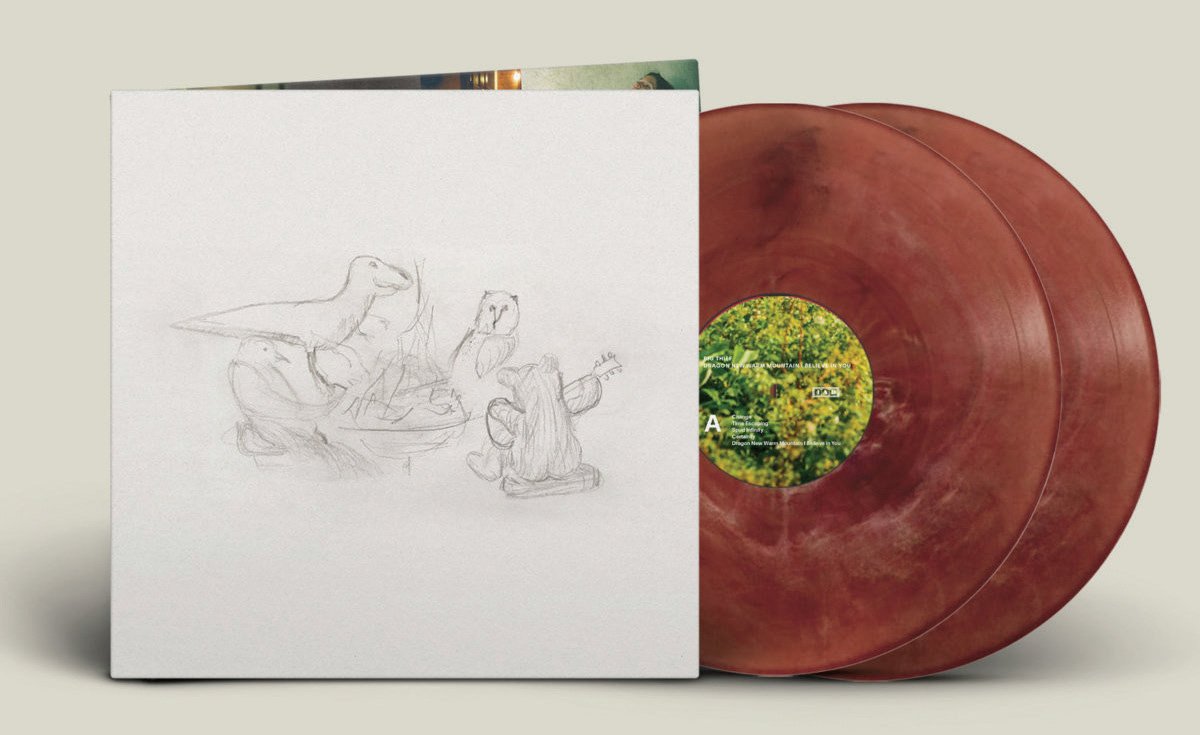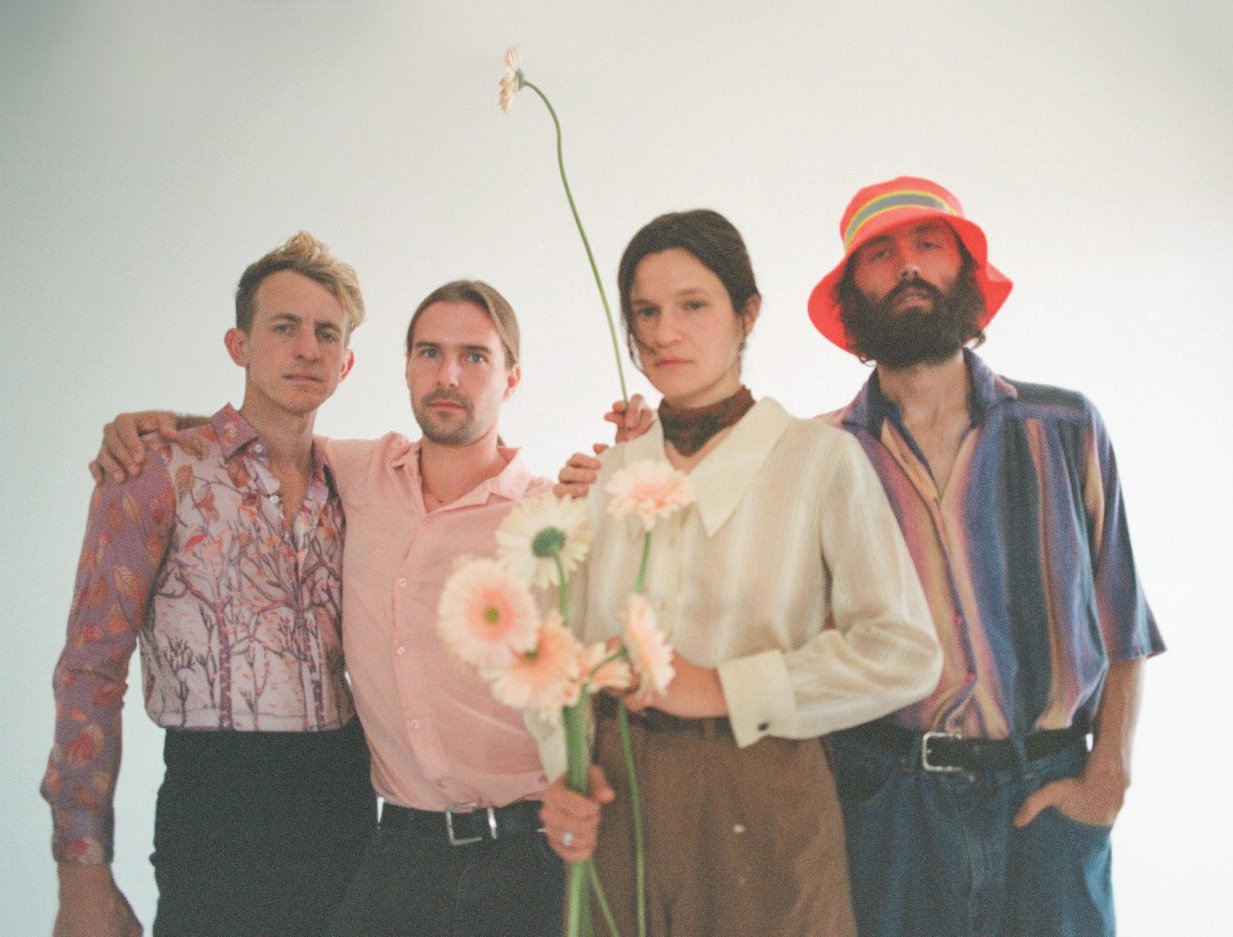
The title of Dragon New Warm Mountain I Believe in You, Big Thief’s fifth studio album, is a phrase which asks to be read twice. Appropriately, it has two births: the lyric first appeared on the track “anything,” off frontwoman Adrianne Lenker’s solo album songs. The transcendental universe of Lenker’s songwriting is our own: one in which the self is synonymous with the other and the atemporal world.
Sonically, all of the band members’ assorted musical roads have obviously led here, across twenty tracks that cohere in subtle, time-delayed ways. Each member has never sounded more comfortable, their music at home within a range of sounds: “Wake Me Up to Drive” highlights a percussive drum machine, which gives way to acoustic guitar on “Promise Is a Pendulum.” One can’t shake the feeling that this is exactly the type of music these four people wanted to capture: art without compromise. On the cutting, curious edge of exploration, each song is a microcosm of the album itself, soft little hills of sound grown from the ground.
Is the only legitimate response to inspiration, inspiration? That we might feel so freed, so seen by another’s openness, that we search for freed-ness within ourselves?
I’m starting to feel old, and yet death seems farther from me now. At my best, I’m a vessel for experience, subway cars and coffee shops, strange little bedrooms I’ve awakened in, eye skin blinking slowly. All significance is in the world. All nonsignificance is in the world. Lenker celebrates and mourns these two simultaneous truths through vocal delivery that ranges from silvery to raucous.
The track “Spud Infinity” poses a question at the album’s core: “What’s it gonna take to free the celestial body?” Where does the mass of humanity, that “one peculiar organism,” turn into disparate selves? At pain? That’s when we feel the most alone, the most singular. But then again, “Everybody steps on ants / Everybody eats the plants.” To live is to suffer. No one of us can claim the drama of being full of blood.
When in pain, the individual becomes less like a self and more like an object, a vector to pain. There is no new pain; the cloud that passes through the heart moves on through
someone else, unseen, unfelt. It threads us together. Perhaps that’s why everything that appears in my head seems instantly old to me; it’s exactly as exhausted, as recycled, as the entire world.
Communion is marred by self-con-sciousness. Lenker sings about Genesis’s pain on the track “Sparrow.” Adam, the betrayer, confesses, “She had the poison inside her, she talks to snakes and they guide her.” What have I done? I ask some days, vaguely humiliated to be with myself, an unnatural thing unfit for Eden.
I wish I could be understood by cawing toward the sky. The closest thing to a scream in written language? The unspoken, binding force of loneliness, the white that bleeds between these words. Our systems maroon us on isles of mind. To sing: the path away from suicide.

So Lenker sings, on that same track—“Sparrow”—the lyric, “Threading my heart through the needle,” an image returned to on “Little Things”: “Seein’ out that needle eye.” Each day squeezed to be seen through our eyes makes pain like a pinprick: it hurts so much because it is so small.
I wish the pain of life was like a needle. Instead, it’s like broad, low swaths of a sky pregnant with meaninglessness. I am there and not there. The banal captivity of subjectivity is captured in “Dried Roses”: “Here I go, there I am / All alone in the pan / In the silence again / Dried roses / Half dead / Half awake / Make a pie bake a cake / Which road will you take / Dried roses / Goodness her goodness me / Goodness eternity / Out you go in ya be / Dried roses.” Here is the pain of present-ness, lyrics so clear over mournful fiddle and acoustic guitar, a testament to each of us stuck each day with our same old selves.
“Blurred View” captures the ubiquity of the self-referential, the loneliness of relating to the abundant world through the singularity of the self: “I am the new disease / The light breeze / The yellow stars glowing through the white trees / I pine for you, pine for you, shine for you / Pine for you.” The electric guitar here sounds dire; the foregrounded drum kit is industrial, blunt, like the stark, repeating white lines of a midnight highway in your high beams. Lenker’s breathy spoken word looks you dead in the eyes and asks you to contemplate what remains to be contemplated.
Each of us enacts a cosmic drama. Blood and leaves both redden, lose oxygen, confess to time. Our bodies revolve around the mellifluous sun. And yet, as noted on the track “Promise is a Pendulum,” “I could never build the shadow / Between your cheek and your eye.” We can witness, marvel, at organic power, but it doesn’t belong to us.
These lyrics and their sum: being yourself means being no one.
These lyrics and their sum: being yourself means being no one. To have been alive just once is to be worthy of sanctity. Perhaps identity is damning. All of the things I could be said to be suffocate me.
The past is all the plot we have: it tells us what we’re like, what we’re liable to do next. I’ve struggled lately with story, it being anathema to present-ness. The shape of the road doesn’t mean movement. It only appears this way when, while driving, one trains one’s eyes straight ahead, never straying out the window to where the white trees speak to stillness.
Perhaps what belongs to us the most is what passes through us, that cloud through the heart that never coalesces into anything espoused. What’s lost to forgetting, the insomniac thoughts in the penalty box of the night we don’t bother to write down.
We’re embedded in nonhuman, natural systems. Time trickles, carrying us down the river little by little. In one of my favorite moments on the album, on the track “Red Moon,” we see how a home is constructed with elements from the natural world; the floorboards that hold us up interweave their stories with our own. The instrumentation is joyful—this is a down-home barn stomper of a song.
Bedroom rising from an old growth tree Bring out the sawmill Cutting the twelve-inch beams Building a pattern a reservoir to fill with dreams Rings like Saturn, telling their old stories [ …] I’ve been here before looking at the wild country Opening the screen door, talking with Diane Lee (That’s my grandma!)
Artistic action, singing, writing, is a humanmade shelter. It’s made to be found; it aspires to be a place where one feels held. A lyric from “No Reason”: “Come together for a moment, look around and dissolve / Like a feeling like a flash / Like a fallen eyelash / On your sweater threading future through the past.” This track, with its transcendent juxtaposition, beckons back to the dissolve, our ancestors asleep all together in the sea. The lyrics say there is no reason to believe, and yet the joyous music here, particularly the sailing flute, tells us that there is no reason not to.
The you in Lenker’s songs reminds us that every other is significant, someone who could, by these words, be made to feel seen, absolved, beloved. As sung in “Simulation Swarm”: “Little Andy, soft in your newborn skin / Only one, little Andy, will you return again / I believe we can renew / And you could be my brother / Once again, fall asleep with our backs against each other.” Though the world will never know us, the bonds we build through whisper or song will tether that loop of time from which we dangle.
I fear I have little tenderness to spare, enough to sing a single song just once. I’m not sure I believe in bones, the stars, the sun—the natural world. I feel a little better in the nighttime, when the sky slams down like a lid. Then I know how the electric beam feels, the unnatural world. From “The Only Place”: “When all material scatters / And ashes amplify / The only place that matters is by your side.” In darkness, together, it’s time to get so close to you.
On the track “anything,” from her solo album songs, Lenker sings, “Dragon in the New Warm Mountain / Didn’t you believe in me?” On the title track of this album, that same ask to be held becomes an act of holding:
It’s a little bit magic Like a river of morning geese In the new warm mountain Where the storm face forms and speaks I believe in you Even when you need to Recoil
The album lives in that place above time where question blooms into affirmation, where I and you dissolve.

